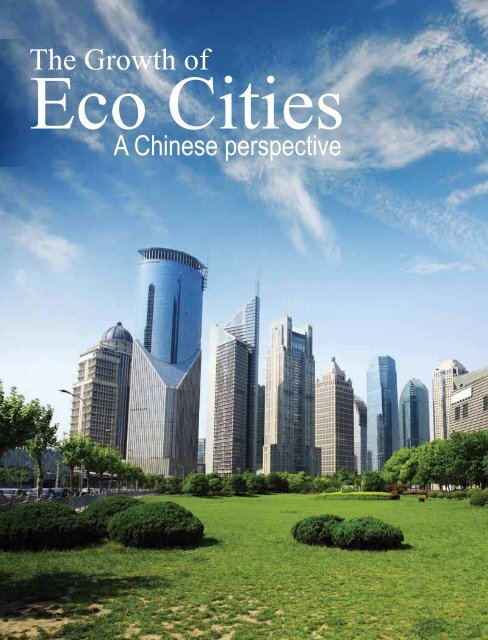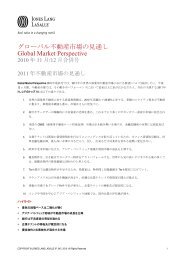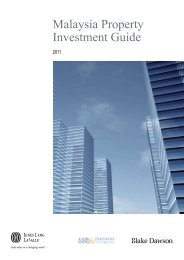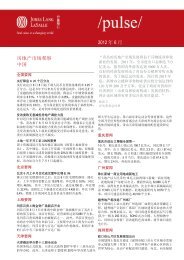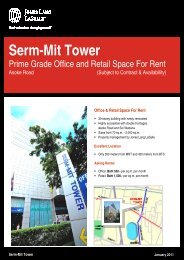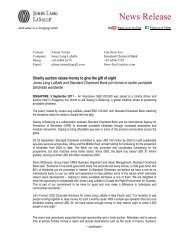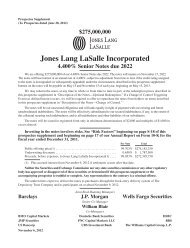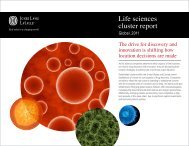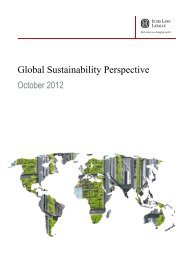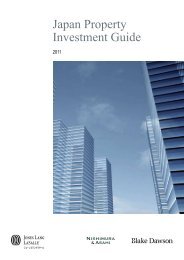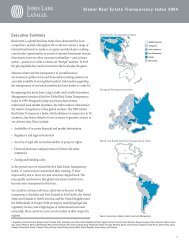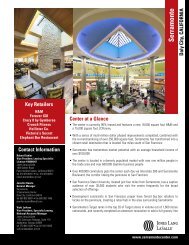Global Sustainability Perspective magazine - Jones Lang LaSalle
Global Sustainability Perspective magazine - Jones Lang LaSalle
Global Sustainability Perspective magazine - Jones Lang LaSalle
Create successful ePaper yourself
Turn your PDF publications into a flip-book with our unique Google optimized e-Paper software.
<strong>Global</strong> <strong>Sustainability</strong> <strong>Perspective</strong><br />
The Growth of<br />
Eco Cities<br />
A Chinese perspective<br />
June 2012<br />
Interview with Parker White, Greater<br />
China Head of Energy and <strong>Sustainability</strong><br />
Services, <strong>Jones</strong> <strong>Lang</strong> <strong>LaSalle</strong><br />
How would you define an Eco City?<br />
It is very difficult to define what an Eco City is, because you have so<br />
many different variables at play with a city. It becomes very regional in<br />
terms of defining specific parameters. I think you would end up falling<br />
back on the general definition for sustainable development, which is<br />
to leverage your existing resources today without sacrificing future<br />
resources for generations tomorrow.<br />
Are there any overall standards for these Eco Cities?<br />
There are emerging standards, and specifically within China the<br />
framework for that has really been the 12th Five-Year Plan, which<br />
has refined further what government has already been doing with<br />
Eco Cities. It’s very much like a building process, what was an Eco City<br />
yesterday is not an Eco City today.<br />
Who actually comes up with the idea for an Eco<br />
City? Is it pitched? Or do the governments go to<br />
someone to do it?<br />
There’s no one size fits all in China, and there very rarely is for any<br />
major economic policy. China is famous for the approach of letting the<br />
different districts and regions work for themselves and seeing which<br />
system works out the best. In some cases the mayor of a city may have<br />
a development in place and chooses to set environmental parameters<br />
around that development.<br />
What about the financing here for these cities?<br />
Just like any other real estate development project, it’s entirely contingent<br />
on the type of development. If you were to look at the <strong>Lang</strong>fang Eco City,<br />
south of Beijing, this was a private developer, so he was driving that.<br />
Compare it to the Hongqiao transportation hub – that’s the Shanghai<br />
Airport Authority. That’s very much a government entity, and they were<br />
driving this project at a district level.<br />
18 19<br />
<strong>Jones</strong> <strong>Lang</strong> <strong>LaSalle</strong><br />
So investors vary, as well, depending on the project?<br />
In Tianjin, for example, you have the Chinese government, the Tianjin<br />
government and the Singapore government coming together as a<br />
partnership. They did all the master planning work. Then they sold<br />
off the plots of land within the community to individual developers. So<br />
that means you have a lot of stakeholders involved. You have got the<br />
initial investment in the form of land coming from the government, the<br />
subsequent investment coming from developers buying the land and<br />
constructing the buildings, and you have the integrated master plan that<br />
comes from the front end with the government as the primary driver.<br />
What opportunities are there for foreign developers<br />
and contractors?<br />
We spend most of our time connecting the right solution providers<br />
to the right consumers, and with what we’ve seen, there’s no shortage<br />
of demand in this market for best practice. If anything, there’s a<br />
shortage of suppliers. It’s an ever-growing market because it needs<br />
to be. As long as the need for development continues, there will<br />
continue to be a need for solution providers.<br />
As far as these Eco Cities go, are governments<br />
addressing that after these Eco Cities are built,<br />
people may not want to live there?<br />
The first test of development is to go through a financial feasibility<br />
assessment. If it is financially feasible, it means that there is a natural<br />
demand; and that’s always a first consideration: Is there a natural<br />
demand for this? A lot of times it’s years and years of pent up demand.<br />
As people migrate to jobs, there’s new demand.


